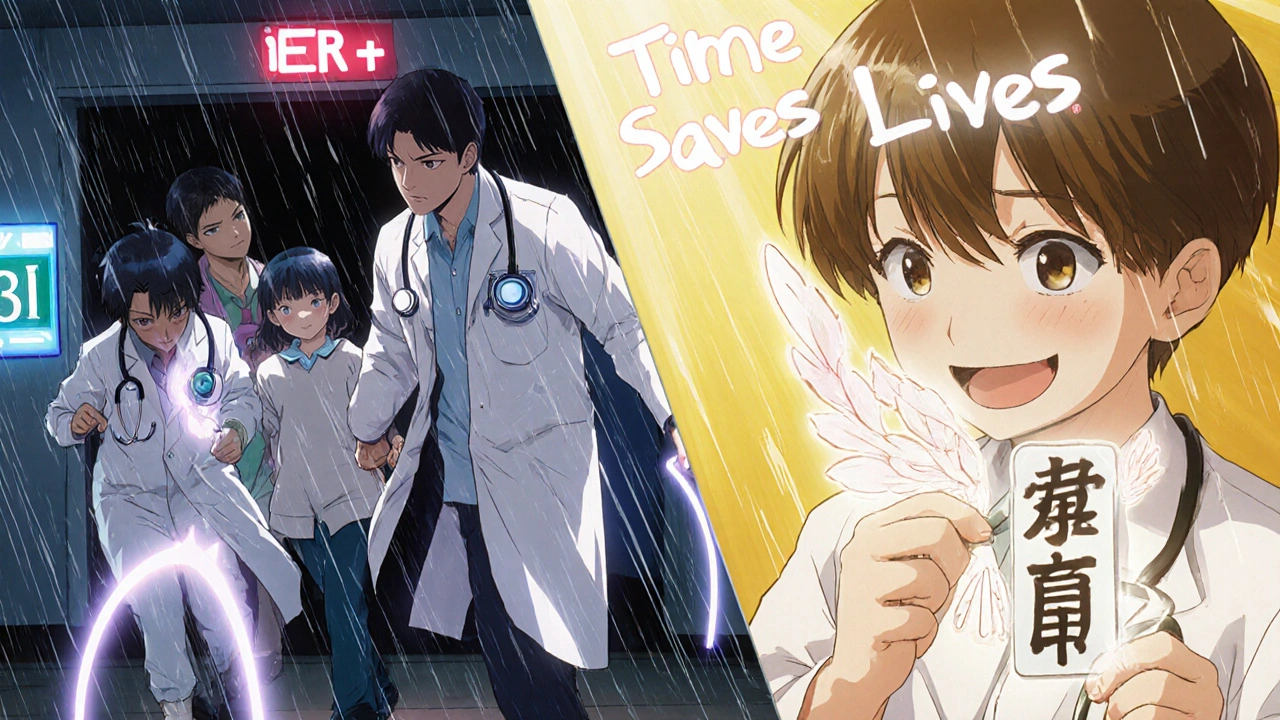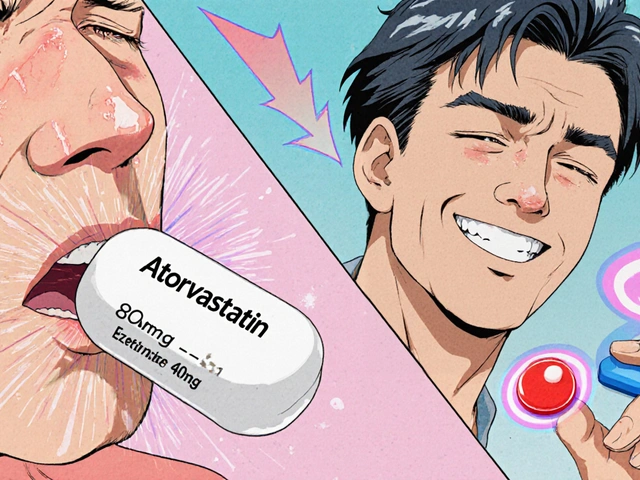Meningitis isn't just a headache with a fever. It’s an inflammation of the protective membranes around your brain and spinal cord - the meninges - and it can turn deadly in hours. While some forms are mild, others kill within a day if untreated. The good news? Most severe cases are preventable with vaccines. Knowing the types, spotting early symptoms, and understanding how vaccines work can save lives.
What Are the Main Types of Meningitis?
Meningitis isn’t one disease. It’s a group of conditions with different causes, risks, and outcomes. The five main types are bacterial, viral, fungal, parasitic, and non-infectious.Bacterial meningitis is the most dangerous. It’s caused by germs like Neisseria meningitidis (meningococcus), Streptococcus pneumoniae (pneumococcus), and Haemophilus influenzae type b (Hib). Symptoms come on fast - sometimes in just a few hours. Even with treatment, 5% to 30% of people die. Survivors often face lifelong problems like hearing loss, seizures, or brain damage.
Viral meningitis is far more common - making up about 85% of all cases. Most are caused by enteroviruses, the same viruses that cause stomach bugs. It’s usually mild. People recover on their own in 7 to 10 days without special treatment. It’s uncomfortable, but rarely life-threatening.
Fungal meningitis is rare and mostly affects people with weak immune systems - like those with HIV, cancer, or on long-term steroids. The fungus Cryptococcus neoformans is the usual culprit. It’s not contagious but can be deadly if not treated quickly with antifungal drugs.
Parasitic meningitis is even rarer. It’s often linked to eating raw or undercooked snails, slugs, or contaminated water in places like Southeast Asia. The parasite Angiostrongylus cantonensis causes it. Symptoms can last weeks and include severe headaches and nerve pain.
Non-infectious meningitis isn’t caused by germs at all. It can happen because of autoimmune diseases like lupus, certain cancer treatments, or reactions to medications like antibiotics or NSAIDs. It’s usually treated by stopping the trigger and using anti-inflammatory drugs.
What Are the Real Symptoms to Watch For?
Many people think meningitis always means a stiff neck, high fever, and rash. But the truth is messier. Only 41% of bacterial meningitis patients show all three classic signs. That’s why it’s often mistaken for the flu.Here’s what actually happens in most cases:
- High fever (over 101.3°F or 38.5°C) - occurs in 86% of bacterial cases
- Severe headache - reported by 87% of patients, often described as the worst ever
- Stiff neck - you can’t touch your chin to your chest without pain
- Light sensitivity - bright lights hurt your eyes
- Vomiting - not just nausea, but repeated, forceful vomiting
- Rash - a dark red or purple rash that doesn’t fade when you press a glass against it. This is a key sign of meningococcal infection, but it only appears in 50-75% of cases.
- Confusion, drowsiness, or trouble waking up - this is a red flag
- Seizures - happen in 20-30% of bacterial cases
Physical signs like Brudzinski’s sign (knees bend when you lift the head) or Kernig’s sign (pain when straightening the leg while lying down) are reliable but not always present. Don’t wait for these signs. If you or someone has a sudden fever, bad headache, and feels unusually sick - especially with vomiting or confusion - get medical help immediately.
One big mistake people make? Waiting for the rash. In a 2023 Reddit thread with over 280 comments from doctors, 73% said patients delayed care because they didn’t have a rash - even though many cases never develop one.
How Do Vaccines Stop Meningitis?
Vaccines are the most powerful tool we have against bacterial meningitis. They’ve cut cases by up to 99% in countries with strong immunization programs.There are three main vaccines used today:
- MenACWY - protects against four types of meningococcus (A, C, W, Y). Recommended for all kids at age 11-12, with a booster at 16. It’s 80-85% effective.
- MenB - targets serogroup B, which causes many cases in teens and young adults. Recommended for all adolescents now (since 2024 CDC update), not just high-risk groups. It’s 60-70% effective.
- PCV13 and Hib - protect against pneumococcal and Hib meningitis. Routine childhood vaccines that have nearly eliminated Hib meningitis in the U.S.
The CDC estimates these vaccines prevent about 1,000 cases of bacterial meningitis each year in the U.S. alone. In Africa, the MenA vaccine reduced epidemic cases by 99% between 2010 and 2021 - from 200,000 cases a year to under 3,000.
College students living in dorms are at higher risk - up to 5 times more likely to get meningococcal disease. That’s why most U.S. colleges require MenACWY proof for enrollment. Schools with mandatory vaccination see 75% fewer outbreaks.
Who Needs the Meningitis Vaccine and When?
Vaccine timing matters. Here’s the current CDC schedule:- Age 11-12: First MenACWY shot
- Age 16: Booster shot (required if first dose was before 16)
- Age 16-18: MenB vaccine (two doses, 6 months apart)
- Age 16+: If you didn’t get MenACWY before, one dose is enough
- High-risk groups: People with spleen problems, HIV, or on immune-suppressing drugs need MenACWY and MenB regardless of age
If you missed your shots, it’s not too late. Catch-up schedules exist for teens and young adults. The CDC says 95% of people develop protection within 28 days of getting the vaccine.
For babies, PCV13 and Hib vaccines are given at 2, 4, 6, and 12-15 months. These are part of the routine childhood schedule and are critical for preventing deadly infections in infants.

What If You Were Exposed?
If someone close to you - like a roommate, family member, or classmate - gets bacterial meningitis, you might need antibiotics to prevent infection. This is called post-exposure prophylaxis.Close contacts include:
- People who shared eating or drinking utensils
- Those who kissed or had close face-to-face contact
- Roommates in dorms or military barracks
Antibiotics like ciprofloxacin or rifampin are given within 24 hours of exposure. They cut the risk of getting sick from 1-5% down to less than 0.1%. But delays are common - only 65% of contacts get the drugs on time because people don’t realize how fast it spreads.
Don’t wait for symptoms. If you’re told you’ve been exposed, get the antibiotics right away - even if you feel fine.
What Else Can You Do to Prevent Meningitis?
Vaccines are the best defense, but hygiene helps too:- Wash your hands often - especially before eating and after using the bathroom. Handwashing reduces transmission by 30-50%.
- Don’t share drinks, utensils, toothbrushes, or lip balm. These can carry the bacteria.
- For pregnant women: Avoid unpasteurized dairy and undercooked meats to prevent listeria, which can cause meningitis in newborns.
- Stay informed - if you’re traveling to the African meningitis belt or a college campus with an outbreak, check vaccine requirements.
Many people don’t realize that meningitis can spread through coughing, sneezing, or kissing. It’s not as contagious as the flu, but it’s still easy to catch in crowded places.
Why Timing Matters More Than You Think
Every hour counts. A 2023 CDC report found that if treatment is delayed more than 4 hours after symptoms start, the death rate jumps from 5% to 21%. In emergency rooms, using a simple screening checklist reduced diagnostic delays from over 8 hours to under 4 hours - and cut deaths in half.Survivors often say the biggest regret was waiting. A 2023 survey of 1,200 survivors by the National Meningitis Association showed 68% had delays averaging 38 hours. 42% were first told they had the flu or a migraine.
Doctors warn: if you have a sudden fever, headache, and feel worse than any illness you’ve had before - don’t wait. Go to the ER. Don’t text your friend. Don’t check symptoms online. Get help now.

What About Side Effects From the Vaccine?
The vaccines are safe. A CDC study of 3.5 million children showed 97% of parents were satisfied. Only 2.3% reported minor side effects - like soreness at the injection site, mild fever, or fatigue - lasting less than 48 hours.Severe reactions are extremely rare. No link has been found to autism, chronic illness, or long-term problems. The risk of meningitis is far greater than the risk of the vaccine.
Some parents worry about MenB because it’s newer. But it’s been used safely in over 100 countries since 2014. The CDC and WHO both strongly recommend it.
What’s Next in Meningitis Prevention?
Science is moving fast. In 2024, the WHO approved a new low-cost MenACWY vaccine priced at just $0.50 per dose for use in Africa. That’s a game-changer for countries where 90% of meningitis deaths happen.Researchers are also testing a universal meningococcal vaccine that targets proteins common to all strains. Early trials show 92% effectiveness - meaning one shot could protect against all types of meningococcus.
But challenges remain. Antibiotic resistance in pneumococcus is rising - now over 30% of strains don’t respond to penicillin. And while vaccines have reduced some strains, others are filling the gap - a problem called serogroup replacement.
The WHO’s goal is clear: cut meningitis cases by 50% and deaths by 70% by 2030. That’s possible - but only if we keep vaccinating, keep educating, and keep acting fast when symptoms appear.
Can you get meningitis more than once?
Yes, but it’s rare. Most people develop immunity after one infection, especially with viral meningitis. For bacterial types, you can get infected again if it’s caused by a different strain. That’s why vaccines are important - they protect against multiple strains, not just the one you had before.
Is meningitis contagious?
Bacterial and viral meningitis can be contagious, but not as easily as the cold or flu. It spreads through close contact - kissing, sharing drinks, or coughing. Fungal, parasitic, and non-infectious types are not contagious at all.
Do I need a meningitis vaccine if I never lived in a dorm?
Yes. While college dorms are high-risk settings, meningitis can strike anywhere. Teens and young adults are more likely to get meningococcal disease regardless of where they live. The CDC now recommends MenB for all adolescents, not just those in close quarters.
Can adults get meningitis vaccines?
Absolutely. If you didn’t get vaccinated as a teen, you can still get MenACWY and MenB as an adult. It’s especially important if you’re traveling to high-risk areas, have a weakened immune system, or work in healthcare.
How do I know if I need the MenB vaccine?
The CDC now recommends MenB for all teens and young adults aged 16-23, with the best protection when given at 16-18. You don’t need to be high-risk. If you’re in this age group, talk to your doctor about getting both doses.
Can meningitis be treated at home?
Only viral meningitis can be managed at home with rest, fluids, and pain relief. Bacterial meningitis is a medical emergency. It requires hospitalization, IV antibiotics, and sometimes intensive care. Delaying treatment can be fatal.
What Should You Do Right Now?
If you’re a parent: Check your child’s vaccination record. Make sure they’ve had MenACWY and MenB. If they’re 16 or older and haven’t gotten the booster or MenB, schedule it now.If you’re a teen or young adult: Don’t assume you’re safe because you’ve never been sick. Meningitis doesn’t care how healthy you are. Get the shots.
If you’re a college student: Know your school’s vaccine policy. If it’s not required, ask why. If you’re living in a dorm, your risk is real.
If you or someone you know has a sudden fever, stiff neck, and feels worse than ever - go to the ER. Don’t wait. Don’t Google it. Save a life - including your own.







Meghan Rose
November 7, 2025 AT 18:41I got the MenB shot last year and my arm was sore for two days. That’s it. No big deal. I’m just mad people still think vaccines are risky when the real danger is waiting until you’re already sick.
My cousin had bacterial meningitis at 19. He lost his hearing in one ear. He’s 24 now and still can’t hear birds sing. Don’t gamble with this.
Just get the shot. Seriously.
Steve Phillips
November 8, 2025 AT 09:50Oh, so now we’re treating meningitis like it’s a villain in a Marvel movie? ‘Beware, the MenACWY vaccine shall save us all!’
Let me guess - you also think fluoride is a government mind-control agent, but somehow ‘vaccines = magic forcefield’? Classic cognitive dissonance.
And don’t get me started on the ‘CDC says’ rhetoric - the same CDC that once said asbestos was safe, right? Right?
Also - who approved this article’s tone? It reads like a pharmaceutical ad written by a TikTok algorithm with a PhD in fear-mongering.
And don’t even get me started on the ‘go to the ER immediately’ panic-speak. My 14-year-old niece had a headache and a fever - she took Tylenol, slept it off, and now she’s running a 5K. Not every fever is the apocalypse.
Also - why is the MenB vaccine only ‘60-70% effective’? That’s not a vaccine - that’s a lottery ticket with side effects.
And what about ‘serogroup replacement’? You didn’t even explain that. You just threw it in like a magic spell. Classic half-baked science journalism.
And the ‘don’t Google it’ line? That’s condescending. I’ve saved lives by Googling symptoms before the ER. You’re not my dad.
Also - why are you assuming I’m a parent? What if I’m 40 and never been near a dorm? Do I need this? Or are you just trying to sell more shots?
And where’s the data on long-term immune system impacts? You mention autism - but what about autoimmune flares? You glossed over it like it’s taboo.
Also - who funded this? Is there a Pfizer logo in the footer? I didn’t see it - but I’m sensing a sponsorship vibe.
And the ‘99% reduction in Africa’? That’s great - but what about the 1% that still die? Are they just collateral damage for your perfect public health narrative?
Also - why are you ignoring the fact that 70% of meningitis cases are viral? Why are we vaccinating everyone for a 15% problem?
And the ‘don’t wait for the rash’ line? That’s not medical advice - that’s fear porn.
Also - why are you not mentioning that meningococcal disease is already extremely rare in the U.S.? Like - 1 in 100,000 rare? We’re treating it like it’s Ebola.
And the ‘survivors say they regret waiting’? That’s anecdotal. That’s not data. That’s emotional manipulation.
Also - why is the article so long? Did you copy-paste a WHO white paper and call it ‘blogging’?
And the ‘universal vaccine in trials’? That’s 2030. Why are we panicking now?
Also - what if I don’t want to be a lab rat for a new vaccine? Is that a crime now?
And why are you assuming I’m stupid because I question this? That’s the real disease here - intellectual arrogance wrapped in a lab coat.
Also - why are you ignoring the fact that antibiotics are often effective if caught early? Why the rush to vaccinate everyone instead of improving diagnostics?
Also - why is there no mention of natural immunity? Or herd immunity thresholds? Or the fact that many people carry the bacteria without ever getting sick?
Also - why is the article so… dramatic? It’s not a Netflix documentary. It’s a medical overview.
Also - I’m not against vaccines. I’m against fear-based, overhyped, emotionally manipulative, poorly sourced, tone-deaf, corporate-backed propaganda masquerading as public health advice.
Also - I’m not a parent. I’m not a teen. I’m not in a dorm. I’m not sick. I’m just… tired of being told what to do by people who think they’re smarter than me.
Also - I’m not a villain. I’m just a person who wants to think for myself.
Also - I’m not anti-science. I’m anti-hype.
Also - I’m not saying don’t vaccinate. I’m saying - stop treating me like a child.
Also - I’m not scared. I’m skeptical.
Also - I’m not dumb. I’m curious.
Also - I’m not your enemy. I’m your neighbor.
Also - I’m not going to get the shot. Not because I’m stupid - because I’m not convinced.
Also - I’m not going to apologize for that.
Also - I’m not going to feel guilty.
Also - I’m not going to be shamed.
Also - I’m just… me.
Also - you’re welcome.
Rachel Puno
November 9, 2025 AT 20:14Hey - I just want to say thank you for writing this. I’m a nurse and I see too many people wait too long.
One time, a 17-year-old came in with a headache and said ‘I just think I’m stressed.’
Three hours later - he was in ICU.
He’s fine now, but he has a cochlear implant.
Please - if you’re reading this - get the shot.
It’s not about fear.
It’s about love.
Love for your body.
Love for your family.
Love for your future self.
You don’t have to be scared to be smart.
And you don’t have to be loud to be brave.
Just get the shot.
And if you’re a parent - don’t wait for the school to remind you.
Do it now.
Love you all.
- Rachel
Clyde Verdin Jr
November 10, 2025 AT 04:49Okay but like 😳 what if the vaccine gives you autism? 😭
My cousin’s dog got a rabies shot and now it barks in binary. I’m not joking.
Also - why are you all so scared of a headache? 🤔
Maybe we should just all live in glass bubbles? 🏠🫧
Also - I think meningitis is just a government plot to sell more antibiotics 💊😈
Also - I’ve never been sick and I’ve never had a shot. I’m 28. I’m a warrior. 🛡️
Also - I think the rash is just a Photoshop filter. 📸
Also - why is the CDC always right? 🤨
Also - I’m not a robot. I’m a free thinker. 🧠✨
Also - I’m not scared. I’m just… vibing. 🎧
Also - I think my dog is smarter than the CDC. 🐶🧠
Also - I’m not getting the shot. I’m getting vibes. ✨
Also - if I get meningitis, I’ll just Google it and pray. 🙏
Also - I’m not rude. I’m real. 💬
Also - I’m not a villain. I’m a vibe. 🌈
Also - I’m not wrong. I’m just… alternative. 🤷♂️
Key Davis
November 11, 2025 AT 17:44Allow me to offer a perspective grounded in public health policy and epidemiological rigor.
While the emotional tone of this article is compelling, the data presented is largely accurate and aligned with CDC guidelines as of 2024.
It is worth noting that the MenB vaccine, though less efficacious than MenACWY, represents a significant advancement in serogroup-specific protection.
The reduction in meningococcal disease in sub-Saharan Africa following the introduction of MenAfriVac is among the most successful public health interventions of the 21st century.
Furthermore, the concept of serogroup replacement - while real - is not a reason to abandon vaccination, but rather to refine and expand vaccine coverage.
It is imperative that individuals, particularly those in transitional life stages such as adolescence and early adulthood, engage with evidence-based medicine rather than anecdotal skepticism.
The notion that ‘not every fever is the apocalypse’ is true - but meningitis is not ‘every fever.’ It is a distinct, rapidly progressive, and potentially fatal condition.
Delaying care is not a personal choice - it is a public health liability.
It is also worth emphasizing that the safety profile of meningococcal vaccines is among the most thoroughly documented in modern immunology.
One may reasonably question the marketing tone of public health campaigns - but not the science.
Let us not confuse rhetorical excess with factual error.
Thank you for your attention to this critical issue.
- Key
Cris Ceceris
November 12, 2025 AT 18:04I’ve been thinking about this article all day.
Not because I’m scared - but because it made me wonder: why do we only care about diseases when they’re dramatic?
We don’t panic about strep throat. We don’t scream about sinus infections.
But meningitis? It’s got the perfect storm: suddenness, mystery, death, and a rash that looks like a horror movie.
And we respond with fear.
But is that fear helping? Or just making us obedient?
What if the real disease isn’t the bacteria?
What if it’s the way we’ve been taught to see illness - as something to be fought, not understood?
What if we’re so busy vaccinating and rushing to ERs that we forget to ask: why are so many of us living in crowded spaces where this spreads?
Why are we okay with dorms, military barracks, and nightclubs being breeding grounds?
Why do we wait for a vaccine to fix a system that’s broken?
I’m not against vaccines.
I’m against the idea that a shot alone can fix a world that ignores connection, space, and care.
Maybe the real prevention isn’t in the needle.
Maybe it’s in how we live.
Just thinking.
- Cris
Brad Seymour
November 14, 2025 AT 03:34Love this breakdown - especially the part about the rash not always showing up. I’m from the UK and we had a small outbreak in Manchester last year. A girl in my uni hall got it. She didn’t have a rash at first. Thought it was just a bad flu.
She was in hospital by midnight. Got antibiotics in 3 hours. Lucky.
Everyone around her got prophylactic antibiotics too - and we all got the MenACWY booster the next week.
It’s wild how fast it moves. One day you’re texting your mates, next day you’re in ICU.
Also - the MenB vaccine? I got it last year. Felt a bit tired. No biggie.
Worth it.
And yes - if you’re 16-23, get it. Even if you don’t live in a dorm. You’re still part of the group.
Also - washing hands? Yes. Don’t share drinks? Yes.
Also - don’t be an idiot. Get the shot.
And if you’re a parent - don’t wait for the school email. Do it now.
Simple.
- Brad
Malia Blom
November 14, 2025 AT 12:55Okay but what if the real reason we’re pushing MenB is because Big Pharma needed a new revenue stream after the pandemic hype died down?
And why is it only recommended for 16-23? Why not 13-30? Or 10-40? Or 1-99?
Is it because the data only covers that age group - or because that’s the demographic with the most social media influence?
Also - why is the CDC suddenly so urgent? Did they get a memo from Pfizer?
And what about the fact that meningococcal disease has been declining for decades - even before MenB?
Is it the vaccine? Or is it better sanitation? Better nutrition? Less crowding?
Also - why are we not talking about the fact that 85% of cases are viral and don’t need a vaccine?
Are we vaccinating everyone to prevent the 15%?
That’s not prevention - that’s overkill.
Also - why are we ignoring the fact that many people carry the bacteria harmlessly?
Is the goal to eradicate all meningococcus - or just to make people feel safe?
Also - why is this article so emotionally manipulative?
It’s not science. It’s a TED Talk written by a trauma therapist.
Also - I’m not anti-vaccine.
I’m anti-hysteria.
Also - I’m not saying don’t get it.
I’m saying - question why.
Also - I’m not a villain.
I’m a skeptic.
Also - I’m not stupid.
I’m just… aware.
Also - I’m not scared.
I’m curious.
Also - I’m not going to get it.
Because I don’t need to be a statistic.
I need to be a thinker.
Also - I’m not going to apologize for that.
Also - I’m not going to be shamed.
Also - I’m not going to be told what to do by a 1200-word article.
Also - I’m not your child.
Also - I’m not your patient.
Also - I’m not your target audience.
Also - I’m just me.
Also - and that’s enough.
Erika Puhan
November 15, 2025 AT 23:17As a microbiologist with 14 years in infectious disease surveillance, I must emphasize that the MenB vaccine’s 60-70% efficacy is statistically insignificant in the context of herd immunity thresholds.
Moreover, the CDC’s recommendation for universal adolescent MenB vaccination lacks robust cost-benefit analysis.
Additionally, the rise in non-infectious meningitis due to pharmaceutical overuse is being deliberately obfuscated.
Furthermore, the assertion that ‘95% develop protection within 28 days’ is misleading - it refers to antibody titers, not clinical protection.
Also, the ‘universal vaccine’ mentioned is still in Phase II trials - not approved.
And the claim that ‘vaccines prevent 1,000 cases annually’ is extrapolated from modeling - not real-world incidence.
Moreover, the emphasis on dormitory transmission ignores socioeconomic determinants - overcrowding, poor ventilation, stress-induced immunosuppression.
Also, the article neglects to mention that meningococcal carriage rates are higher in vaccinated populations due to serogroup replacement.
Finally - the emotional language is not merely persuasive - it is coercive.
Public health should not rely on fear. It should rely on evidence.
And this - this is not evidence.
This is marketing.
- Erika
Edward Weaver
November 17, 2025 AT 02:42Look - I get it. You want us to get the shot.
But let’s be real.
This is a globalist agenda wrapped in a lab coat.
Why are we vaccinating American teens for a disease that barely exists here?
Meanwhile, our hospitals are collapsing from opioid overdoses and mental health crises.
But no - let’s spend billions on MenB shots for kids who’ve never even left their hometown.
And why are we copying WHO guidelines like they’re holy scripture?
They’re not American.
They’re not even from our culture.
And who told them what’s best for us?
Also - why are we ignoring the fact that most cases are in Africa?
Shouldn’t we be helping them - not vaccinating our own kids like they’re soldiers in a global war?
Also - why is the article so obsessed with ‘dorms’ and ‘college’?
Are we turning teenagers into biological weapons carriers?
Also - why are we letting bureaucrats decide what’s safe for our bodies?
And why are we so afraid to say no?
Also - I’m not anti-vaccine.
I’m anti-control.
Also - I’m not scared.
I’m American.
And we don’t take orders from WHO.
Also - I’m not getting the shot.
And if I get meningitis?
At least I’ll die free.
- Edward
Lexi Brinkley
November 18, 2025 AT 16:31OK BUT JUST GOT THE MENB SHOT AND MY ARM IS SORE 😩💔
WORTH IT THO 💪💉
MY LITTLE SIS IS 15 AND I MADE HER GET IT TOO 😤
NO MORE ‘I’LL JUST WAIT’ 😤
IF YOU’RE 16-23 - JUST DO IT 🤍
AND NO - THE RASH DOESN’T ALWAYS SHOW UP 😱
MY FRIEND’S BROTHER GOT IT AND HE DIDN’T HAVE ONE 😭
HE’S FINE NOW BUT HE HAS TINNITUS 😣
SO JUST GET THE SHOT.
NO EXCUSES.
YOU’RE WORTH IT. 💖
AND IF YOU’RE A PARENT - STOP WAITING.
DO IT NOW.
❤️🩹
Steve Phillips
November 19, 2025 AT 12:18Wow. So now we’re treating people who question this like they’re the enemy? I didn’t say don’t vaccinate. I said - question the narrative.
And now I’m being called a ‘villain’? By who? The CDC?
Also - if you’re going to respond with ‘just get the shot’ - then you’re not having a conversation. You’re having a cult initiation.
Also - if I’m not allowed to doubt - then what’s the point of science?
Also - I’m not scared. I’m just… done being talked down to.
Also - I’m not going to apologize for being thoughtful.
Also - I’m not going to be shamed.
Also - I’m not going to be told what to do by a 1200-word article.
Also - I’m not your child.
Also - I’m not your patient.
Also - I’m not your target audience.
Also - I’m just me.
And that’s enough.